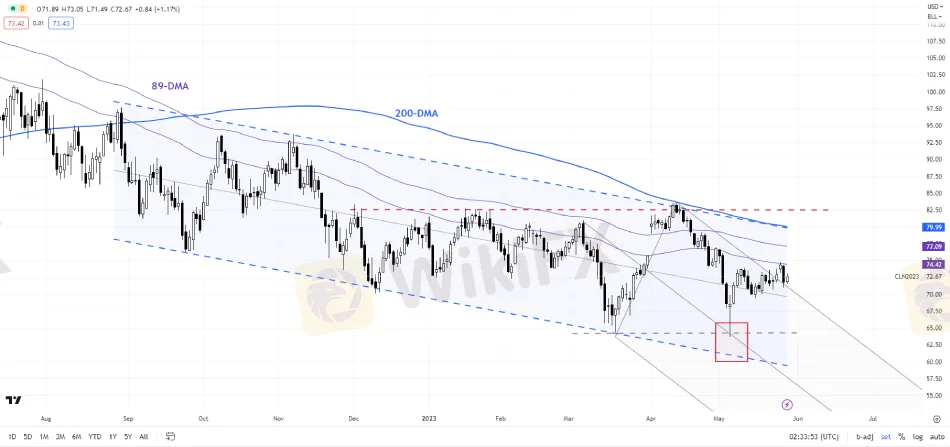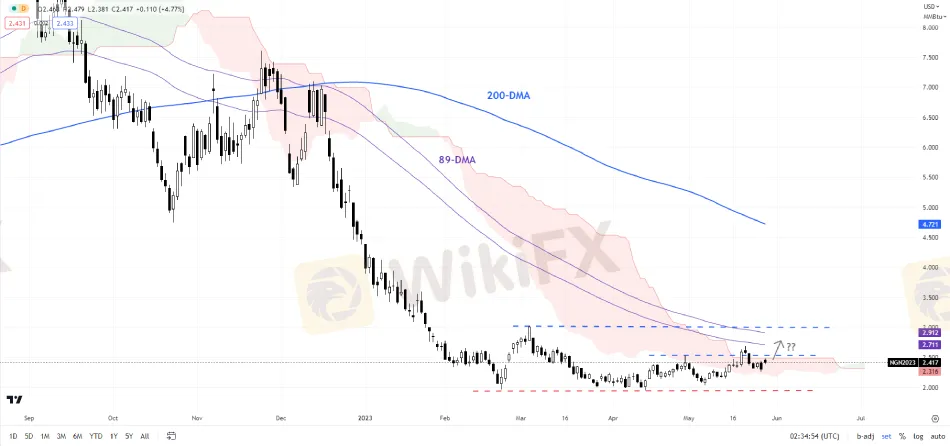简体中文
繁體中文
English
Pусский
日本語
ภาษาไทย
Tiếng Việt
Bahasa Indonesia
Español
हिन्दी
Filippiiniläinen
Français
Deutsch
Português
Türkçe
한국어
العربية
What Could the OPEC+ Meeting Signal for Crude Oil? Has the Downtrend in Natural Gas Resumed?
Abstract:Crude oil recovered some losses after Washington raised the government's debt ceiling, despite Russia's stance against OPEC+ production changes. However, US Federal Reserve interest rate hikes could cap growth. Meanwhile, natural gas prices showed slight recovery, influenced by milder US weather and recovering Canadian exports.

Crude oil managed to regain some stability following last week's losses, with the market reacting positively to a recent debt ceiling increase in Washington, averting a potential government default. However, the energy commodity faces uncertainty due to Russia's position on OPEC+ production and looming changes to US Federal Reserve interest rates.
An Unaffected Oil Market Despite OPEC+ Stance
Despite remarks from Russia's Deputy Prime Minister Alexander Novak stating the unlikelihood of OPEC+ implementing further changes to production levels at the upcoming June 4 meeting, crude oil sustained its recovery. This came following a stern warning from Saudi Energy Minister Prince Abdulaziz bin Salman cautioning speculators to 'brace themselves' for impact, indicating potential output cuts.
Crude Oil Monthly Chart

Nevertheless, this ongoing recovery in crude oil prices could be limited due to forthcoming adjustments to the US Federal Reserve interest rates and concerns about uneven demand recovery in China, post-Covid. The current market anticipates a 60% probability of a 25-basis-point hike in the Fed rate on June 14, a significant increase from the 17% chance predicted just a week ago. Furthermore, the market does not foresee any rate cuts until the year concludes.
Technical Chart Analysis: Crude Oil Treads Carefully
From a technical standpoint, crude oil's ability to maintain above 64.00 may suggest that the commodity may have bottomed out after several months of decline. Yet, there are no immediate indications of a reversal in the downward trend. For any diminishing downward pressure, the oil needs to surpass the April high of 83.50. Until this level is breached, the path of least resistance appears to be neutral to bearish.
Crude Oil Daily Chart

Natural Gas: A Slight Recovery Amid Export Rebounds
Natural gas prices, on the other hand, took a hit on Friday, only to recover a fraction on Monday morning in Asia. This downward trend can be attributed to the milder weather conditions in the US and a bounce back in Canadian natural gas exports to the US.
Natural Gas Daily Chart

Weather Conditions and Canadian Exports Impact Natural Gas
Forecasts suggest that the weather across the Lower 48 states is expected to transition from cooler-than-average conditions from May 26-29 to mostly normal conditions from May 30 - June 10. This change in weather is expected to affect natural gas demand.
Earlier in May, wildfires compelled Canadian producers to decrease their natural gas exports to the US. However, it appears that the exports are gradually returning to the levels observed before the fires last week, influencing the prices of natural gas.
Natural Gas Monthly Chart

In conclusion, both crude oil and natural gas markets are displaying resilience in the face of numerous challenges. The oil market's response to potential production changes, interest rate hikes, and uneven demand recovery are significant factors to watch. Similarly, the natural gas market will need to navigate the changing weather conditions and fluctuating export levels.
Ensure you're up to date with the latest news by downloading and installing the WikiFX App on your mobile device. You can download the App from this link: https://social1.onelink.me/QgET/px2b7i8n.

Disclaimer:
The views in this article only represent the author's personal views, and do not constitute investment advice on this platform. This platform does not guarantee the accuracy, completeness and timeliness of the information in the article, and will not be liable for any loss caused by the use of or reliance on the information in the article.
Related broker
Read more

The Startling Differences Between Hedging and Arbitrage
The two risk management investment tools - hedging vs arbitrage - have been helping investors achieve their respective financial goals. Explore this comparision to understand their functionalities, the investment purpose they serve, the risk attached, and several other aspects.

Why Octa Is the Ideal Broker for MetaTrader 4 & 5 Users
Octa is a well-reputed, renowned, and award-winning broker in the forex market. It offers many exclusive features to investors, such as educational resources, a wide range of assets, dedicated customer support, and access to popular trading platforms like MetaTrader 4 and 5.

Dubai Police Arrests 4 People in Connection with High and Quick Profits Online Trading Scam
Dubai Police have arrested four individuals involved in defrauding many investors via fake online trading schemes that promised high and quick returns. Check out the arrests, international connections, and more in this story.

Spanish Regulator, CNMV Alerts Investors against 11 Scam Brokers
Spain’s Financial regulator, CNMV (Comisión Nacional del Mercado de Valores) CNMV has issued warnings against 11 forex brokers operating without proper authorization.
WikiFX Broker
Latest News
What WikiFX Found When It Looked Into Vestrado
Is the Forex Bonus a Genuine Perk or Just a Gimmick?
eToro Joins Hands with Premiership Women’s Rugby
OctaFX Was Fined $37,000 for Operating Without a License
Hantec Financial: A Closer Look at Its Licenses
Saxo Bank Fined €1 Million by AMF Over Compliance Failures During IT Migration
CySEC Flags Two Unlicensed Investment Platforms: greymax.net and finotivefunding.com
Hantec Markets Appoints New Executives for Growth in Dubai
Olymptrade Under Fire – Fraud Allegations and Investor Outrage
GoPro, Krispy Kreme join the meme party as Wall Street speculation ramps up
Currency Calculator


